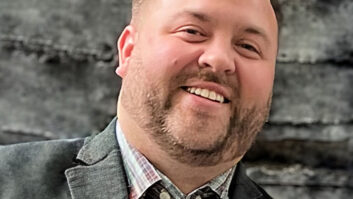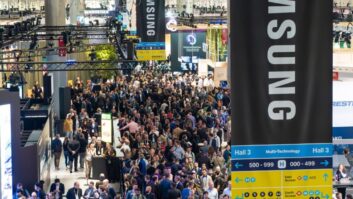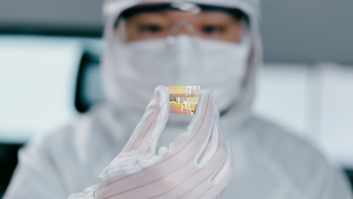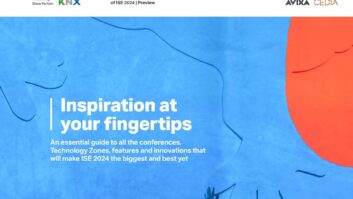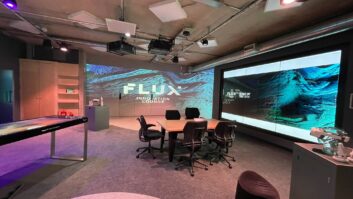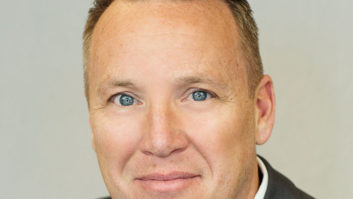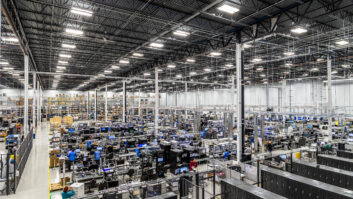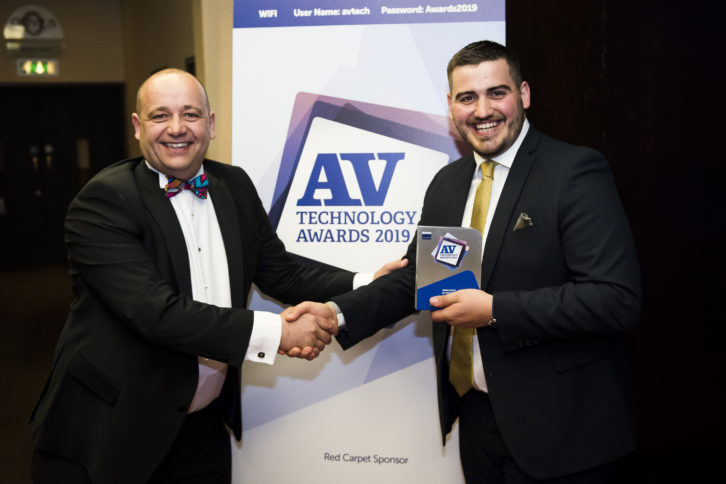
Jo Ruddock catches up with Visavvi’s Elliott Moores, winner of the Newcomer of the Year accolade at the recent AV Technology Awards.
What does the award mean to you?
It’s a little bit surreal for me. When I was made aware that I’d been put forward, is was a little bit odd because I’m just coming to work every day and doing my job. I’m very humbled. There are lots of people that I work with on a day-to-day basis without who I categorically wouldn’t have been able to achieve what we have – internally and externally. It’s not just me, I’m just one part of a team of great people.
Why do you think you were put forward for the award?
I was probably nominated because I was the one most vocal about us not settling for being who we were! When I joined the business five years ago we were very successful; we’d been in the industry for nearly 50 years, we were a household name within the industry and we had no real need to change. But, I also joined the business at a time when we were just about to go through a management buyout, and we knew that there were significant trends changing in the industry, which meant that we needed to reinvent ourselves in some areas, and we needed to be more than we’d been before.
I joined the business as a project manager and the way we delivered projects, the methodology that we used, I felt could be so much better. We could definitely increase our control over projects and ultimately the end result would be better for the customer. Through delivering a number of the company’s large scale projects during my time in that role I think we did that – we proved that this new way of working was effective.
When I progressed into the management role we continued to expand this across every way of working. We had three major production offices and we were inconsistent in our ways of working – everybody was great and we were doing great work, it was just inconsistent. My opinion was very much that if as a client I was to order a solution from Visavvi and I’m in London, I should be able to feel that same experience as I would do if it was installed in Manchester or in Germany. That’s what I wanted to work on.
That most have been quite daunting to come in to the business at a young age and implement these ideas?
It’s bold when I’m 23 at the time and the business has been around and been successful for many years – well before I arrived. I had worked with people before who went in two completely different ways of trying to achieve things; those who talked a lot and actually did very little; and those who just said “right, my way of proving what’s right for the business is that I’m going to show you” – leading by example. I genuinely felt that that was the best way to go about it. So, I built a hybrid method of delivering projects which merged different ways of working and that I thought suited our business and our industry best.
I put it to the Directors and it was seen as very much a drastic shift. So I said “OK, I’m going to run my projects this way and at the end of every project we’ll do an analysis of how satisfied the customer is, how on budget we were, how on time we were, and how efficient we felt we were in our ways of working”. We did that every time. Fortunately for me, or it would have been very embarrassing, it worked, which was great.
I continued to apply that same mentality to everything that we wanted to achieve. We’re a team of 250 plus, so to try to totally redirect a ship that’s carrying that many passengers is a huge challenge. We had to try to bring all of the right people on board into the team, with the right approaches and ensure everyone is passionate about we do, because it really is cool and we do some amazing things.
I wanted people to remember that working here, we were coming to work for something more than just a pay cheque, we really wanted to create something quite special and transform this company, and that meant changing a lot of opinions.
As Brits we love nostalgia and how it used to be, and we as a business were no different. The challenge was getting across that this industry’s changing and if we’re not careful we’re going to be left behind. We cannot rest on the fact that we’ve been great for 50 years – we have to continually push to be better in every single area of what we do. And that’s how it started.
Did you meet much resistance when you first started doing this?
In some areas I did because I was only 23 years old and I was blindly committed to what I wanted to achieve for the business. The business didn’t even know they wanted to achieve it by this point, it was just me deciding that this is what I wanted for us because I thought that was right.
You’re bound to meet resistance to change in any walk of life, in any role, in any business, in any industry, but you are going to get more resistance when you’re telling people twice your age, who’ve been doing it for years that we need to fundamentally change our way of working.
The only way around that was to realise that actually, they’re not going to listen to me if I tell them, we had to work really hard to show why and get the guys who were resistant involved. Get them involved in the projects, get them involved in the conversations about why we wanted to completely rip up the way we’d built racks historically, and change that to incorporate a more serviceable and sustainable approach.
We also needed to alter our buying methods to make sure that we were scalable. If we delivered a project in the UK then that same system had to be scalable for the customer into Europe, the US and Asia. We needed to completely change our way of thinking. Most people quickly got their heads around that and started to get involved in the conversations. One thing you can’t argue with is that over those many years we had a team with a phenomenal amount of experience that I needed to try to bring out of them to make sure that we were making the right decisions. Once they understood that this was very much a collaborative approach to solving a problem for the business and they felt they were part of that decision making process, that reluctance soon dropped.
You’ve progressed quickly during your time in the AV industry. Why do you think that is?
I don’t think there’s anything that I have physically done that’s meant that I’ve progressed into different roles. It would destroy me to think I was coming to work every day to live in a world where we were never getting better. I could do not do that; I could not get out of bed and be passionate about what I do every day if we’re not constantly moving forward and constantly making things better. That’s all I ever wanted to do, and I think the business has put me in roles where they think I’m most effective to make that happen.
What are you most proud of during your time at Visavvi?
When I joined we were historically split into three offices in Manchester, York and Farnborough, and we were very much almost three separate businesses. I was given the responsibility to be regional technical manager in the North and my sole role was to bring two groups of people in two offices who’d never really met one another and who’d historically competed financially and target-wise, together to make one department.
It didn’t happen overnight because you’ve got all the personal politics and everything else to get over. You’ve got four people doing the same job in two different buildings and in a completely different way, so you have to work really hard to get over the personal elements as much as anything else before you can make ways of working consistent and truly make us one department.
I remember we used to have vans crossing one another on the motorway, one going in one direction and one going the other, which was ridiculous. Now I look and I we’ve built a culture where everyone really wants to work hard. We’ve got a refusal to accept mediocrity and that is all I ever wanted – to create a team and a group of people who knew that actually we would not accept mediocrity in anything that we do to deliver a project.
If you ask any of our engineers they’ll say that the most important thing for them is to stand back from a system when they’ve installed it and for the customer go “Wow, that is amazing”. You can’t buy that! It’s the same with project managers, it’s the same with rack builders, and the designers, it’s that sense of achievement you just can’t buy, no matter how much money you pay, and that’s what we wanted to give to staff and to customers.
When we talk about the recruitment problems we have in AV we tend to focus on the technical side of the roles but a lot of what you’re talking about looks at the people skills and the personal elements. Do you think we should perhaps change our focus as we look to attract new talent?
When I started in this industry I was 16 and I didn’t know a single thing. I was just fortunate that I’ve learnt from having both really positive and negative experiences in roles and in business, in different countries and different cultures. I learnt my technical skills from working in teams of great technical people, I learnt my people skills from working in great technical teams and I learnt how not to manage people by working in really bad technical teams.
I don’t think there’s a lack of technical skillsets, I think the difficulty is, the skillset has changed. I remember when we were going from analogue video to digital video, that was a huge shift and it was a lot of education for businesses and integrators to understand that you couldn’t just attach an oscilloscope and see exactly what was happening with a signal. This new era of digital 1’s and 0’s, totally blew people’s minds.
The size and scale of the shift now is five maybe 10 times that change. The industry is full of phenomenally skilled and technically intelligent people, the problem is, that intelligence, knowledge and that skill is based around an outdated way of working in an industry that’s completely changed. Our challenge is to adapt.
If you say the word programmer in the AV industry, everyone thinks of Crestron, Extron, AMX control system programmers. Three years ago, we could see the way the industry was going. I went through a process when I was building training programmes for the technical teams where I said: “actually, I need you to understand more universal programming languages – HTML5, JavaScript, CSS, Python, those sorts of programming languages”. I knew that very quickly there would be a change where we were never going to be programming systems, we were never going to be integrating boxes, we were going to be integrating platforms. That’s the big shift.
Every AV integrator I speak to is having the same problem. We were fortunate that we identified that some time ago and we’ve had the opportunity to probably upskill staff. The challenge now is keeping up to date and keeping everyone on top of their skillset.
How important do you think qualifications and certifications are to the AV/IT industry and its future?
I think AVIXA has done a phenomenal job in creating an education and certification programme for an industry that’s not based around standards. That’s the difficulty. The IT industry is built on standards – IEEE standards, networking and integration, even wireless networks and infrastructure, they have their own standard that everyone has to work to.
AV is not a standards-based industry, there is not one way to doing any one thing. So AVIXA has done a fantastic job in giving guidance and best practice. But the challenge now as the IT/AV convergence happens, is that we’re going to have to try and mould an AV industry that’s not standards directed into an IT industry that is standards directed.
It’s no surprise that there’s only Middlesbrough College providing an AV technology educational programme, yet you can go to any college or university across the country and across Europe and they’ll all have IT networking courses.
Do you think the Middlesbrough College course is a step in the right direction?
I know that Colin Etchells, our technical director, and Dave Willie, who’s an ex-student of Middlesbrough College, have been working with Jack [Laidlaw, who runs the BSc AV Technology Course at the college] and students up there. Jack and the guys are doing a great job in trying to offer as wide a portfolio of skillsets as they possibly can. Working with Jack, the conversations we had were very much focused around IT, programming, standard languages, platform development, things like that.
What do you think can be done to encourage more people to consider AV as a career?
I think the difficulty is that probably 95% of people that I know in the AV industry didn’t set out to be in the AV industry, they fell into it in one way or another. When I think all the way back to when I entered the industry it was because I had an interest in audio and I wanted an outlet for that.
I think the work that needs to be done is to broaden the education piece at secondary level. I’ve got a step daughter who’s at school now and she’s learning digital skills and programming to be able to control robotics. The challenge in secondary education is making people aware that there are alternative routes and having a support platform in place that allows us as an industry to handle them into the industry.
We’ve tried, we’ve got three apprentices in the business now. One was working at an IT reseller sitting at a small desk answering calls by day and playing with amplifiers at the weekends. Today he’s building and testing our racks and programming systems, and he’s absolutely in his element. That’s the perfect example of somebody who’s studying something that they love, but he will openly tell you that he didn’t feel there was a clear outlet other than music production which wasn’t what he wanted.
I think we’ve got a responsibility as an industry, to grow on the back of what Middlesbrough College are doing and really try to make more channels available for students and the younger generation to come into businesses on the back of studies in IT or music production or whatever that may be.
I think there’s a lot that could be done. We’ve had a lot of discussions over the last 12-18 months about how we’re going to start introducing ourselves at university job fairs, really to go out there and to put our hand up. It’s about educating that generation about actually what the industry is.
The things that we’re developing internally now with the teams at Visavvi, will totally transform the way that our clients businesses work, the way they manage their facilities, the way they measure energy consumption. The amount of work and investment and effort we’ve put into our work in IT is phenomenal and I don’t think students at a job fair will have an understanding that that’s the sort of things that we’re working on. We’re solving real business critical issues through the use of AV, whereas they just sort of see it as projectors or speakers – it’s not true, it’s not real what I think that generation are being told the industry is today. And that’s why we struggle to make it appealing.
In the UK there’s such a diverse range of students from abroad coming here for our education structure, so we’ve actually got the greatest pool of talent we could possibly wish to get our hands on in the industry. The problem is, they haven’t got an outlet other than Middlesbrough College.
What are your plans for the future?
We’re working a lot at the minute on developing a hosted IT service management platform that will allow greater interaction and access for our customers globally. We’re so engrained with our customers now; we don’t want to rest, we don’t want to just say thank you very much for your purchase order, we want to be coming to you and saying “look, this is what we’re thinking of doing and this is how it can help you”.
We’ve built this ITSM platform so that we can completely transform the client service experience; we want them to be able to walk in a room and with the click of a button be on a video service call with our engineers back in the UK or Germany or Holland, to be able to resolve any issues.
We’re also putting a phenomenal amount of time into IoT because we want to really transform – it’s not about the screen and the videoconferencing codec or whether you’re using Zoom or Teams, it’s about solving business-critical issues for our clients through technology. We understand those problems that we and our clients share, we know that we can resolve these with our ITSM platform and our IoT facilities.
It’s truly fantastic to be involved in that.
